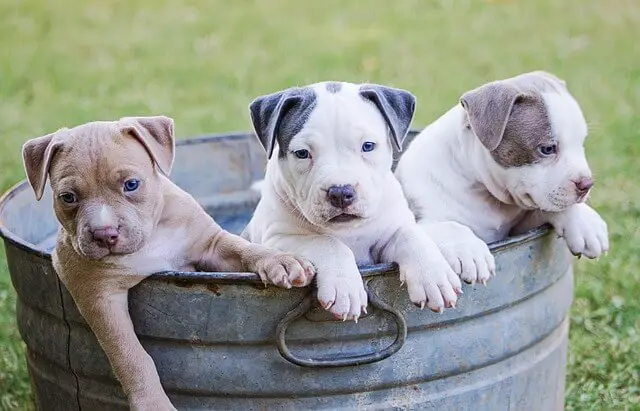How Many Puppies Can a Dog Have?
09.08.2021.
Dog breeders and owners often have to deal with dog pregnancies, and one of the first questions that pop into their minds is, “How many puppies can a dog have?” The exact answer to that question will depend on more details and the context of the question. Here is what you should know about dogs and how many puppies they can have.
The first thing we need to make clear is this - when most of us ask the question, “How many puppies can a dog have?” we mostly think about female dogs and a single litter. We will answer that question first, but we will touch on another issue with male dogs and the puppies they sire.
How many puppies can a female dog have?
Dogs of different sizes can have a different number of puppies in a single litter. It would be impossible for a tiny dog breed, like the Yorkshire Terrier, to have 10 puppies in a single litter. However, big dog breeds, like the Mastiff or Saint Bernard, can easily have up to 12 puppies in a single litter. This is an important thing to understand because it will influence the price of the puppy. Here are some of the average litter sizes for different popular dog breeds;
- Golden Retriever - 8 puppies
- Labrador Retriever - 7 puppies
- Poodle (Standard) - 7 puppies
- French Bulldog - 3 puppies
- German Shepherd - 8 puppies
- Beagle - 6 puppies
- Bulldog - 4 puppies
- German Shorthaired Pointer - 9 puppies
- Rottweiler - 8 puppies
- Dachshund - 5 puppies

FUN FACT: Many online sources will probably tell you about Tia, the Neapolitan Mastiff. She had the biggest litter in the recorded canine history, with 24 little Neapolitan Mastiff puppies. Another fun fact is that based on the records of all internationally recognized dog breeds, the average litter size is 5.4 puppies in a single litter.
What determines the number of puppies?
As you can imagine, a few different things will determine how many puppies a dog can have. Most of us are interested in this topic when we have to deal with doggy pregnancies in our own homes. It doesn’t matter if you are a breeder or an owner of a pregnant dog; knowing what to expect will allow you to prepare for different scenarios. Here are some of the things that will influence the exact number of puppies in a litter;
Breed
Your dog’s breed will determine the size of the litter. A Great Dane can have more puppies than the French Bulldog, so you can expect the average litter size. However, if you have a crossbreed, you should probably focus on other things to determine the size of the litter.
Age
Female dogs that are in their prime will produce more puppies than older females. Their bodies are stronger; they are healthier and most fertile between the second and fifth years (for most dog breeds). Small breeds live longer than large breeds, so their puppy-bearing prime lasts a few years longer.

Size
The main thing you should focus on is the dog’s size. It is fairly simple; the smaller the dog, the smaller the number of puppies she will produce. It is simply a matter of limited space - tiny dogs simply cannot accommodate so many puppies in their belly. The larger the dog, the more puppies you can expect. However, that doesn’t mean exceptions cannot happen.
Health and diet
Healthy dogs will produce more puppies. The health of the puppies is also better if their mother is in the best shape possible. If your dog eats high-quality, nutritious food, chances are she will have a larger litter.
Genetics
Another important factor is genetics. A dog’s individual genes can determine how many puppies she can have. The bigger the gene pool, the more puppies you can expect. Some dogs simply have genes for smaller litters, and some will have genes that will produce large litters of puppies.
The “popular sire” effect
A big problem that modern-day dog breeders deal with is the “popular sire” effect or syndrome. When a male dog becomes extremely popular by winning dog shows, agility competitions, or does anything that is appealing to dog breeders, many dog breeders will want to breed their female dogs with the popular male.
Breeders will want to mix the “superior” dog’s genes with their female dogs for many reasons. The popular male has to be extremely healthy, which means the puppies the dog will sire will most likely be very healthy. The popular male has a great body structure, making him amazing at dog shows. Of course, dog breeders want to produce puppies that will be contenders to the throne in different shows.
The good news is that the popular male dogs produce great puppies, but there is a downside. With modern ways of insemination, popular male dogs can produce hundreds of puppies. That might not sound like a bad thing, but an entire breed’s gene pool gets smaller. We end up with a huge generation of puppies that cannot be interbred because they are closely related.
This is not an issue for female dogs. They can only produce a certain amount of litters, and breeding a popular female dog when she reaches a certain age is simply not safe anymore.
In conclusion
The exact answer to the question, “How many puppies can a dog have?” is - it depends. The exact number will depend on the dog’s breed, age, size, health, and genes. Large, healthy dogs in their prime can produce large litters, so if you are dealing with a dog pregnancy, you should focus on your dog’s size for a ballpark number of upcoming puppies. The exact number will be confirmed by your vet through an ultrasound.
World Dog Finder team







Share